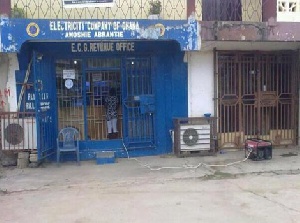Vendors of the Electricity Company of Ghana’s (ECG) pre-paid electricity credit have decried the poor profit margin of 1.9 percent allowed by the electricity distributor for sales made.
For a sale of Gh?1,000 made, a vendor earns a profit of GH?10.90.
Most of the frustrated vendors told the B&FT that they are now “seriously considering” opting out of the business as their operating costs make the business of helping ECG maximise revenue a costly venture.
"I paid a five-year rent advance of Gh?15,000 for my shop. Then I purchased a computer, printer; fixed a security barricade, bought some seats; and made some other miscellaneous expenditure to set up this place. However, I don’t earn enough to keep running a successful business," a disgruntled vendor at Mallam, a suburb of Accra, told the B&FT.
“I pay GH?200 as salary, spend GH?50 on electricity every three weeks; I pay transportation of Gh?10 from where I operate to Bortianor district office to purchase the pre-paid quota weekly. Every two weeks I buy a packet of A4 sheet at a cost of Gh?15 to print receipts for customers," he said.
The vendors, who pleaded anonymity for fear of being targetted by the electricity distribution company, explained further that ECG used to supply them with the receipts, but for close to three months now that arrangement has been discontinued without any prior notice or reason.
Another visibly worried vendor further added that the rising costs of operation in the business, particularly wages and salaries, is eating away their profit margin as human resources required to efficiently undertake the business are on the high side.
“Ideally, you need two people running the shop and that is financially draining," he added.
The inability of ECG to fully pay for the amount of power it receives from power producers, due to their weak tariff collection regime, has resulted in power producers piling on debts as they fight the odds to keep up with demand.
ECG has had challenges in revenue collection, with system losses making up about 22.3 percent. Ironically, government and other public sector organisations were reported as indebted to ECG to the tune of US$500million as at March 2013.
The company also faces cash flow difficulties, especially in densely-populated areas where illegal power connections are rampant.
It is as a result of these and other similar challenges that the pre-paid metering system was introduced by the ECG to curb commercial loses and improve revenue generation.
The idea of privatisation for revenue collection in electricity distribution is still being considered by government.
Vendors have also cited the unbridled issuance of licences as partly responsible for the decline of the business. Initially, when the concept was introduced, two vending points were supposed to be two kilometres apart.
One vendor who operates in Gbawe, a suburb of Accra, said: “I can count four vending shops in this area alone. The worst part of it is when your system develops a fault and you are unable to serve customers.
They go to another vendor. From then your shop will be branded with a ‘bad’ tag, so that those customers will never come there again. But if other vendors are far away from you, customers will still patronise your shop if they need pre-paid credit".
“The distance between my shop and the next shop is just about 20 metres. I did report it at the Bortianor district office of the ECG, but I was told it is a situation beyond their power because the licence was issued by a top official at ECG and so I should just accommodate the person and do my work," the vendor said.
Another vender quizzed: "How can all these financial obligations be settled with this meagre profit rate we are given by the ECG? How and when can we make profit to take care of our needs and handle financial responsibilities in the family, and even in society?
“We therefore appeal to the ECG and government to do something about this predicament we are going through. We are not asking much. Even if ECG increased the rate to just 5 percent we would be happy," he noted.
Click to view details



Business News of Monday, 12 January 2015
Source: B&FT
ECG vendors angry over poor commission
Entertainment
















